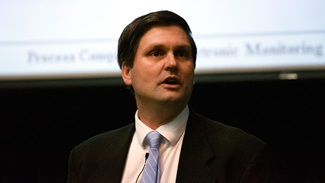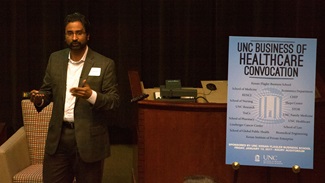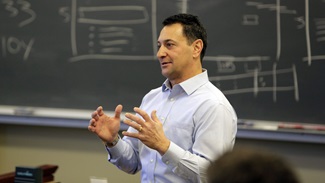News & Stories
Leading the business of health
 Healthcare in the U.S. is big business – equivalent to the fifth largest economy in the world, with more than $3 trillion spent annually. It also has big challenges regarding costs, affordability, access, outcomes, and regulatory and policy concerns.
Healthcare in the U.S. is big business – equivalent to the fifth largest economy in the world, with more than $3 trillion spent annually. It also has big challenges regarding costs, affordability, access, outcomes, and regulatory and policy concerns.
To tackle the complex issues facing business and society, UNC Kenan-Flagler Business School launched the Center for the Business of Health in 2018. The multidisciplinary initiative connects the Business School with UNC’s leading health sciences divisions – including the Eshelman School of Pharmacy, Gillings School of Global Public Health, School of Nursing, School of Dentistry and School of Medicine – with the Schools of Social Work, Information and Library Science, and Law, and College of Arts & Sciences departments.
“To my knowledge, no other business school has undertaken what we are doing – collaborating across our campus to establish a business of health initiative that will be second to none in the world,” says Doug Shackelford (BSBA ’80), dean and Meade H. Willis Distinguished Professor of Taxation at UNC Kenan-Flagler. “North Carolina is at the center of the big issues affecting the U.S., including the urban/rural divide and economic development. If we do this right, we will have an impact on our state that will ultimately extend to the rest of the U.S. and the world.”
The UNC community believes in collaboration in a way that not every university does, says Brad Staats, faculty director of the Center for the Business of Health and an operations professor at UNC Kenan-Flagler. “Healthcare is increasingly an interdisciplinary issue and the real challenges facing it will not get solved by any one person. As we figure out the science of how to do things better, we have the opportunity to improve health outcomes, reduce costs and improve access for everyone.”
The Center focuses on three areas: conducting world-class academic research, providing transformative interdisciplinary education, and convening conversations to harness the power of UNC.
Creating knowledge
 Research that integrates the thinking of our foremost scholars to address challenges for healthcare organization is a major component of the Center’s mission.
Research that integrates the thinking of our foremost scholars to address challenges for healthcare organization is a major component of the Center’s mission.
Business faculty are researching topics related to healthcare such as quality improvement, healthcare accounting, pricing and promotion, practices used by physicians to determine whether to prescribe specific pharmaceuticals and effects of high-deductible insurance plans on health outcomes.
For example, although flu vaccination has been shown as the best way to avoid a flu epidemic, vaccination rates in the U.S. still hover around 50 percent. To date, most initiatives to increase this have focused on patients, with limited success. Faculty are working with a leading flu vaccine service provider to instead encourage providers to drive vaccination rates. They implemented a randomized controlled trial with more than 200 primary care clinics throughout the U.S. focused on creating provider incentives and ranking-based feedback.
Increasingly projects take a team approach and so involve researchers across Carolina. Collaborative studies include burnout in nursing, workplace safety and the impact of high-deductible health plans. The scholarship also includes research by interdisciplinary student teams and doctoral students, such as business doctoral student who is studying rural health and hospital issues.
Preparing business leaders

Preparing students for careers that will improve healthcare and increase the scale of its impact is a driving force behind the Center’s work. Many MBA students choose UNC Kenan-Flagler because of its Healthcare Concentration, and roughly 15 percent work in the industry after graduation.
The Center leads all healthcare programs and curriculum at the Business School, including the dual-degree programs: PharmD/MBA with the UNC Eshelman School of Pharmacy, MHA/MBA and MSPH/MBA with the UNC Gillings School of Global Public Health, and MD/MBA with the UNC School of Medicine.
Bringing an industry perspective to the Center and the classroom is Markus Saba (MBA ’93), a former Eli Lilly and Company senior executive. He is executive director of the Center and teaches students about the business of health as a professor of the practice of marketing.
“We are strengthening our existing offerings, creating new ones, and exploring cross-disciplinary education opportunities with schools across campus,” says Saba.
New MBA courses include a healthcare analytics class with the Carolina Health Informatics Program, a Global Immersion Elective on the business of health in China and Japan, and a virtual reality simulation in which students set up a new healthcare outpost in Cameroon. The STAR Program, in which students consult on real projects for companies, is offering seven healthcare projects this year and students from disciplines across campus, including medicine and public health, are participating.
The Center works closely with the MBA Healthcare Club, the School’s most active student organization with 145 members, to provide industry preparation, organize healthcare-focused treks and connect with alumni mentors.
The Healthcare Club hosts an annual interdisciplinary case competition as a way for students to apply what they’ve learned in class. Each team must include a mix of students from schools across UNC’s campus. “It is a tremendously successful event, something that never existed before,” says Staats. “Public health, pharmacy and business school students all interact – just as they will be required to work together in in industry.” On that heels of that event, the club organized the first national case competition with teams from Duke, Case Western, Emory, Michigan, Indiana and Duke.
“Our students amaze me on a daily basis – their focus, passion and knowledge of healthcare is remarkable,” says Saba. “Hearing employers say how well prepared our graduates are to succeed in the industry is very rewarding.”
Convening conversations
 The third area of focus is convening important conversations. The Center brings together key industry and governmental stakeholders to create a neutral ground for breakthrough discussions and developments.
The third area of focus is convening important conversations. The Center brings together key industry and governmental stakeholders to create a neutral ground for breakthrough discussions and developments.
The Center works with advisory groups to shape its vision and outcomes. The Industry Advisory Board, comprised of C-suite executives from U.S. healthcare companies, partner on research initiatives and provide guidance to ensure the program is preparing students with the right skills and knowledge. Leading alumni serve on the Center’s Leadership Board to provide feedback on the curriculum, strategy and student engagement.
“When we brought together the industry advisory board, they pointed to the University’s role as an honest broker to have conversations,” says Staats. “We bring folks together to ask difficult questions and offer some of our own perspectives to try to strengthen the practice of healthcare.”
Another avenue for convening practitioners, policymakers, academics and students is the annual UNC Business of Healthcare Conference. It explores such topics as delivery payment models, digital health, pharmaceutical pricing, the opioid crisis, ethical decision making by providers, and quality improvement in delivery.
There’s also the annual UNC Business of Healthcare Research Convocation, which brings people from across the UNC campus to discuss research collaboration opportunities.
The needs in healthcare – in business, in society – are enormous and we are seeking ways to help, share information and opportunities, says Staats. “At our best we are a catalyst. We do a number of things well, but we enable others to do even more.